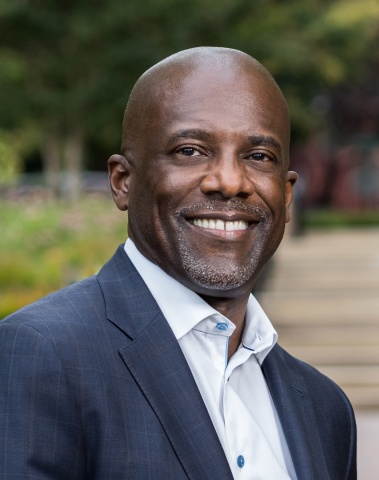There is an all-out assault on asylum from this administration. Given that asylum and access to lawyers for those seeking asylum have been focus areas for Human Rights First for 42 years, our efforts will continue unabated notwithstanding the pandemic.”
In February 2019, Hardy Vieux (MPP/JD '97) traveled to Tijuana, Mexico, to better understand the needs of asylum seekers at the United States’ southern border. That trip laid the foundation for a program to help people navigate the process, at the same time the Trump administration imposed new restrictions on who could make requests for asylum in the U.S. Vieux, the senior vice president for legal at Human Rights First (HRF), and his colleagues wanted to help asylum seekers before they got to the U.S. border. They created a “Know Your Rights” project to help asylum seekers prepare documents, paperwork, and perhaps legal representation. His team made additional trips in January and February for in-person meetings. When the pandemic swept the U.S. and Mexico in March, that travel stopped but the program remains, now communicating with the asylum-seekers almost entirely by using mobile phones and the WhatsApp application for speaking and sending texts and even images of documents..
It is one of the adjustments HRF has made in its work to protect immigrant rights even in the face of the pandemic. Vieux, a Ford School Towsley Foundation Policymaker in Residence, says their work is even more urgent now, as the administration is using COVID-19 as another reason to restrict immigration and asylum rights.
“When the pandemic started in March, we turned our attention to getting some legal assistance to immigrants who were in civil detention and at higher risk of contracting the virus, all of whom happened to be brown or Black immigrants,” he says.
HRF filed federal lawsuits in California and New Jersey to seek the release of 14 detainees, all of whom were detained in cramped, prison-like conditions where social distancing and hygiene necessary to prevent infection were impossible. With the help of law firms donating their services, Human Rights First secured the release of all four from the California facility, two of whom were mothers. In New Jersey, four were released through court action, and another three released by the government after HRF filed its federal case.
The release of 11 detainees may seem a small victory, but Vieux says it fits their model: they help individuals through individual asylum representation, initiating “impact litigation”, or advocacy around certain cases or issues, all of which can resonate with other organizations working on asylum and immigrant rights.
“Our focus is very much on getting people lawyers and challenging unlawful policies in federal court. We're bringing lawsuits in federal court on behalf of a small number of named individuals. The hope is if we should win, that relief would redound to the benefit of hundreds, or maybe thousands, who might then have a chance to seek asylum or benefit from some other relief. We also help our clients secure high-quality lawyers to make their asylum case before an asylum officer or an immigration judge,” he explains.
Earlier this year, HRF also started leading and coordinating bi-national monthly phone calls, with as many as 20 Mexican and American nonprofits and NGOs participating. “We find out what is going on, share information, contacts, and strategies. Given the pandemic, sharing information and talking regularly is one way of coping with the information deficit born of the fact that we can no longer travel to meet with our asylum-seeking clients stuck in Mexico.”
In June, the administration proposed a set of asylum regulations that goes after the whole asylum system. Some proposals go against U.S. law or even international treaty obligations, according to Vieux.
“So we are giving thought to how to best deal and challenge that, because it's going to be such a game changer. It changes the standards for seeking asylum, who can seek it, how you can seek it. The proposal really leaves no stone unturned. What can you do? You can bring it to people's attention, lobby members of Congress, and use the process to make your concerns about the proposed regulations known.”
He remains determined. “There is an all-out assault on asylum from this administration. Given that asylum and access to lawyers for those seeking asylum have been focus areas for Human Rights First for 42 years, our efforts will continue unabated notwithstanding the pandemic.”
Read more about Hardy Vieux in this July 2018 Michigan Alumnus profile.
